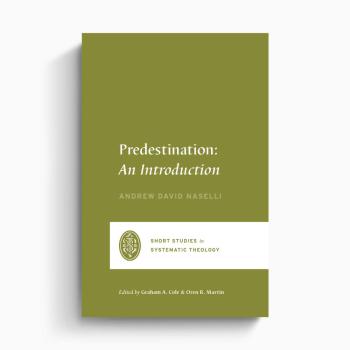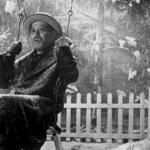Review of The Intentional Christian Community Handbook: For Idealists, Hypocrites, and Wannabe Disciples of Jesus, by David Janzen and a Community of Friends (Part 2 of 2)
By ALEXIS NEAL
And now for my biggest issue with this book. I said in Part 1 that I think Janzen’s idea of community lacks a solid gospel foundation. This is actually a twofold problem. First, Janzen veers dangerously close to a works-based understanding of salvation. Second, the communities he advocates are united not around their shared position in Christ as those who have been forgiven their sin and reconciled to God in the cross, but by the particular social issues about which they are passionate.
A clear understanding of Janzen’s beliefs about salvation is hampered by his own lack of clarity on the subject. The sample language for defining a community’s beliefs contains little more than a passing statement that the members are Christians (198). And this lack of specificity is deliberate. Janzen observes,
We live in a postdoctrinal age. A younger generation has little use for long belief statements crafted by winners of old controversies. Rather, they appreciate the challenge of a community focused on a simple response to Jesus and his call to ‘come and follow me.’ (92)
I don’t disagree that this is, in fact, the tendency of younger generations. What I question is whether that tendency should be indulged. Absent a clear creed or statement of faith, we are left with confusing—and sometimes conflicting—statements about what the gospel really is.
For example, Janzen claims to know that ‘God was reconciled to me through Jesus on the cross’ (48) and calls Jesus ‘the sacrifice that ends all sacrifices’. (185) He quotes the leader of the Christian Community Development Association, John Perkins, who himself quotes Edward Mote’s classic hymn ‘The Solid Rock’: ‘My hope […] is built on nothing less than Jesus’ blood and righteousness … All other ground is sinking sand.’ (144) Very encouraging, and biblically sound.
But he also claims
God has taken a terrible risk with us, that we will abuse this forgiveness. And we do abuse it again and again. Still, God has condescended to our level in Jesus, allowing us to hurt him, trusting that, in the end, all this forgiveness will change us, and we will pass on this amazing grace to others so that they too may be changed. God has given up trying to control us in order that we might learn how much we are loved. And in receiving this love, we are empowered to love others in the same way. When a community does this, it is heaven on earth. (116-17)
Leaving aside the implications for God’s sovereignty (God is portrayed as ‘trusting’ in the desired outcome like an anxious kid crossing his fingers that his model airplane will finally fly), Janzen seems to imply that God saves us, not by paying for our sins and working real change from within, but by wearing us down with forgiveness until we are convinced that we should be nicer. In other words, we are saved not by Christ’s work on the cross which atones for our sin, but by Christ’s example on earth which inspires us to live a life of love. Indeed, there is little discussion of the truly evil nature of sin and the high cost of the forgiveness—and more than that, the expiation—offered to us in Christ. Janzen’s teaching focuses on following the way of Jesus; he barely even mentions faith in the finished work of Jesus. While we are indeed to follow Christ’s example and love our neighbor, to the extent we treat this as the means of salvation rather than its fruit, we pervert the gospel.
And Janzen seems to tread perilously close to this line. For him, the church’s mission is all about love: ‘A gathered life where people love, serve, confront, and forgive each other is the main thing about being a church.’ (184) And this is where things get sticky. Because a church should do those things. But that’s not the main thing about being a church. We are all united, ultimately, by shared faith in the gospel, and we live out that faith by loving, serving, confronting, and forgiving each other. But faith comes first.
Again, I don’t know that Janzen would disagree with me. I am not here attempting to cast aspersions on Janzen’s own beliefs or to question his salvation. But the book isn’t clear on the gospel message. Let me put it this way—I think a devout and compassionate Muslim, Buddhist, atheist, or pagan could read and agree with pretty much everything Janzen says. And I think that’s a problem.
This lack of clarity completely disappears when Janzen starts talking about peace. The communities in this book are all Anabaptist-leaning, and take a hard stance on pacifism and non-violence as a biblical requirement for Christians. And, while I myself do not agree with these beliefs, there are certainly arguments to be made from Scripture that support the merits of non-violence. But what troubles me is that Janzen appears to be much more passionate about non-violence than he is about Christ or the gospel. He seems more interested in winning people to the cause of non-violence—or to community life in general—than he is in winning people to Christ. Members of other communities wax eloquent about a variety of social issues—battling racial injustice, caring for refugees, working for urban restoration, supporting food justice, etc. These communities appear to be united, not around the gospel, but around the particular social injustice they wish to rectify. This is consistent with Janzen’s understanding of Christ’s mission—not that people from every tribe, nation, and tongue would believe and be saved, but that the kingdom of God will come on earth as it is in heaven (30, 68, 75).
Which is tricky, because while we are certainly to pray for God’s will to be done on earth, and one day the kingdom of God will fully infiltrate and transform the world, that day has not yet come. The creation of heaven on earth is, quite simply, not the job of a Christian (or the church). Only Christ’s return can effect that change. Which is why, though Christians should seek to rectify injustice wherever we see it, we are not ultimately united by our shared belief in and opposition to that injustice. We are united by our shared belief in Christ who saved us.
For a great example of unity in Christ working itself out in service to others, I recommend the sermons of Pastor David Platt. Platt and the Church at Brook Hills have done an excellent job of encouraging Christians to live out Christ’s command to love our neighbors and seek justice on their behalf—some members have even set the example by relocating to marginalized areas of society in order to effect meaningful change from within that community, or selling their homes in order to serve the church and support missions—while still extolling the primacy and centrality of the gospel message.
Because of Janzen’s two-fold emphasis on works, both as the (maybe?) means of our salvation and the basis of our unity, I cannot honestly say that his vision of community is founded on the gospel. As such, I cannot advocate it as a viable solution to the many problems he (correctly) identifies.
I received this book through the Patheos Book Club.
_______________________________________________________________
Alexis Neal is an attorney in the Washington, D.C., area. She regularly reviews young adult literature at www.childrensbooksandreviews.com and everything else at quantum-meruit.blogspot.com.












